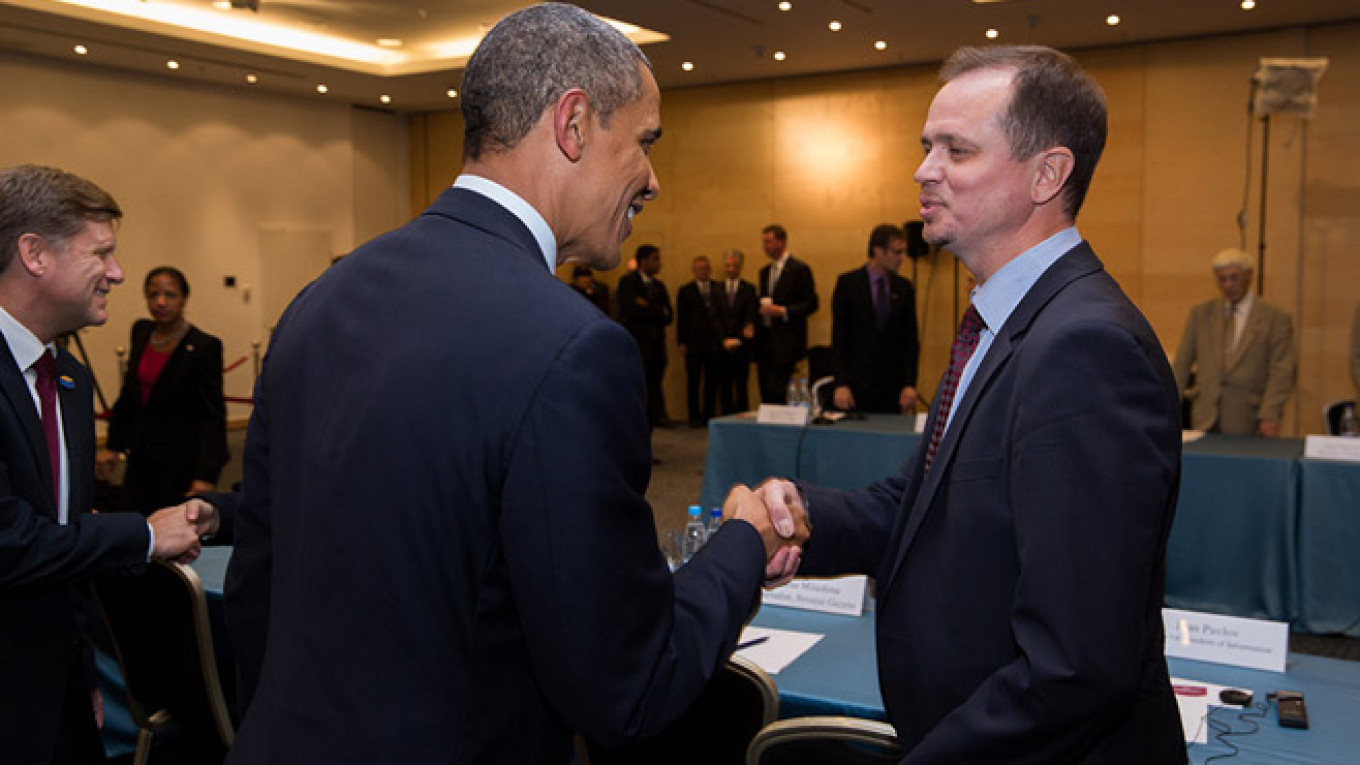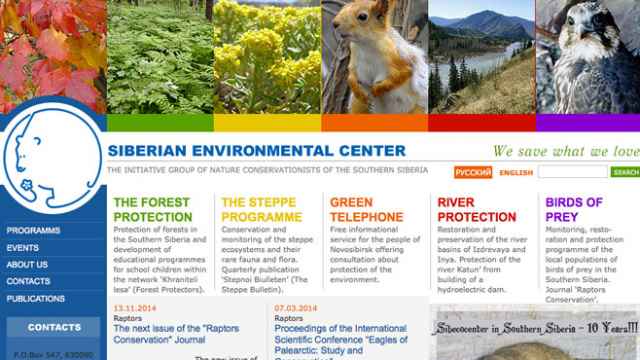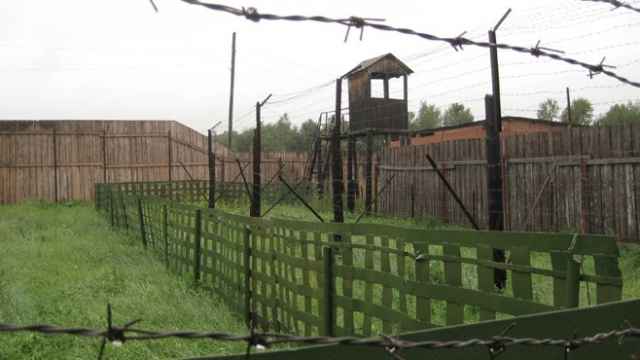The life of St. Petersburg human rights lawyer Ivan Pavlov has changed dramatically in the last 12 months. After his American wife was deported as a "threat to national security" in August, the family moved to Prague, but Pavlov returns regularly to lead high-profile cases and manage a group of associates that continues to work despite his organization — the Freedom of Information Foundation — being put on the notorious "foreign agents" list of NGOs by the Justice Ministry later that month.
"We left, settled down in Prague and since then I have lived in two homes: one home where my work is, and the other where my family is. We have lived like that since August," Pavlov said in a recent interview with The Moscow Times.
After he took on the high-profile case earlier this year of Svetlana Davydova, who was accused of treason, the case against her was closed and the lawyer has since taken on several more cases of Russians accused of treason and espionage.
Pavlov knows first-hand of the difficulties currently faced by Russian NGOs, having lost his battle to prevent the Freedom of Information Foundation from being labeled a "foreign agent" under a controversial 2012 law that labels any NGOs receiving foreign funding and engaged in ill-defined "political activity" as "foreign agents," a term critics say is reminiscent of Stalin-era spy mania. He has, however, vowed not to give up and is actively searching for ways for his organization and others to continue their civic activities.
New Battle Tactics
"We think the government is now doing everything possible to paralyze civil activism," Pavlov said, adding that most of the activities of Russian NGOs — those that have not closed, rejected foreign funding or stopped any activities that might be considered political — have now been reduced to defending themselves against prosecution.
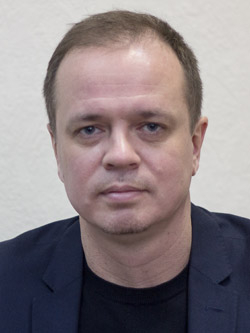
Human rights lawyer Ivan Pavlov
"Basically, this 'foreign agents' law is achieving its goal. If we engage with it and do everything they are forcing us to: start defending ourselves, collecting certificates and documents, explaining ourselves — that's it, we stop doing the work that used to be effective.
"It is important that other colleagues, even those who are not on the list, realize that it is impossible to work under the conditions created by the current legislation on 'foreign agents' and non-profit organizations. Under these conditions, it's impossible to work as independent non-profit organizations."
Currently, Pavlov has his mind set on showing that there is a way out.
"We are lawyers, we understand that non-profit organizations are a merely one way of implementing civic activities," Pavlov said.
"The most important thing now is to make people who have got used to working in the format of a non-profit organization realize that it is not the main thing. Preserving a non-profit organization should not be the goal, or an end in itself. The goal should be to preserve civic activities — and that is possible.
“We have reformatted our activities. We do not deny for a minute that we are getting out from under the jurisdiction of the legislation on non-profit organizations and foreign agents. We now have a commercial organization. We recently created a non-profit organization abroad, which is not subject to the law on ‘foreign agents.’ And we will continue what we were doing.”
The people who were involved in the Freedom of Information Foundation's human rights program now act as Team 29 — an unofficial group of rights advocates named after the article of the Constitution that guarantees freedom of information and bans censorship, Pavlov said.
Personal Experience
The Freedom of Information Foundation was put on the "foreign agents" list on Aug. 28, 2014 after months of fighting the authorities' attempts to pin the label on the NGO.
After the first inspection by the Prosecutor's Office during a wave of checks in which hundreds of NGOs were visited by prosecutors across Russia in 2013, the NGO — whose primary aim is the transparency of state bodies — was issued a warning, but the inspections were resumed with a vengeance in early 2014. As a result, the Freedom of Information Foundation was said to be "performing the function of foreign agents" by combining foreign funding and political activities "aimed at changing state policies or forming public opinion with the same goals."
According to Pavlov, the Prosecutor's Office found five instances of what it saw as political activities: Pavlov's participation in a meeting between U.S. President Barack Obama and Russian human rights activists, a report that the NGO's program director made at an Open Government Partnership conference in London, an article analyzing legislation on personal data on the organization's website, the Right to Know awards event held by the foundation in 2013, and finally, the act of auditing the authorities' official websites and reporting on what information they publish and what they do not.
Meet the President
Pavlov met with Obama at the Crowne Plaza St. Petersburg Airport hotel when the U.S. president was visiting St. Petersburg for the G-20 summit in September 2013.
"Obama met with us, there were probably eight human rights activists from across Russia," Pavlov said. "Everybody spoke on their own topic, I spoke about freedom of information."
According to Pavlov, the meeting elicited an "unhealthy interest" from the authorities, though he said he had not spoken about Russian issues.
"[Obama] asked, 'How can I help you?' I said, 'Well, you can hardly do anything about freedom of information here, but America is a country that many take their example from, for better or worse," Pavlov said.
"I said that a good example could be set in America. First, I said, change the legislation on state secrets, make it more transparent, so that the procedures are clearer and more distinct. Secondly, I proposed that he come up with an initiative to the United Nations to create a certain standard of openness for governments, an international convention that countries could join. Thirdly, I said, 'free [Chelsea, formerly known as Bradley] Manning' — who leaked data about abuse by the military in Iraq. There was no Russian context at all."
A court then dismissed the Obama meeting and London conference as private initiatives by the individuals concerned, but the other three grounds for declaring the Freedom of Information Foundation a "foreign agent" were upheld.
A Second Front
In August 2014, in the middle of his legal battle to keep his NGO off the government's "foreign agents" list, Pavlov found out that his wife Jennifer Gaspar's residency permit had been revoked.
"On Aug. 5, we received a letter from the FMS (Federal Migration Service) notifying us that her residency permit had been revoked — she is a U.S. citizen — and saying she had to leave Russia within 15 days of the decision," Pavlov said.
"We looked below to see when the decision had been taken, and realized that we had received the letter (as it came to us by mail) on exactly the 15th day."
After Gaspar appealed the decision, a court hearing revealed that the FMS had acted on the instructions of the Federal Security Service, or FSB, a successor agency to the Soviet KGB, which declared Gaspar — who worked as an adviser to NGOs — a "threat to national security." No grounds were given for the allegation.
"Our petitions requesting that the FSB attend the court hearing, or that they at least share the details of the decision with us, were ignored by the court, which dealt with these requests very quickly, dismissing all of our demands," Pavlov said.
Further attempts to appeal the FSB's decision or even find out the grounds behind it were greeted with the response that the document was classified. Two lawsuits initiated by Pavlov against the FSB are currently being heard: one disputing the decision itself, and the other contesting the legality of classifying it.
Pavlov does not doubt that the cases against his organization and his wife are connected, but has refused to give up his crusade to uphold human rights in Russia.
Taking on the Untouchables
One of the highest-profile cases Pavlov has been involved in recently was the case of Svetlana Davydova, a woman put in prison on suspicion of treason despite having small children, one of whom she was still breastfeeding. The mother of seven was transported from her town in the Smolensk region to Moscow's high-security Lefortovo prison and faced up to 20 years in prison for allegedly calling the Ukrainian embassy in Moscow in April 2014 to share her suspicions that Russian troops were being deployed to eastern Ukraine. An online petition for her immediate release quickly collected 60,000 signatures.
"Her arrest caused [a strong] reaction in society: 'How could it be; a breastfeeding woman with many children in Lefortovo?'" Pavlov said.
"The authorities, of course, realized that they had shown their true colors and tried to remedy the situation by releasing her, but did not drop the case straight away."
Pavlov described the accusations against Davydova as "absurd."
"The authorities were unwise to open this case, because to accuse Svetlana Davydova is to admit that her allegations were well-founded and that Russian troops are being sent to fight in Ukraine," he said.
"That would lead to more criminal cases, perhaps at an international level. The court in The Hague would perhaps become interested in some people. But because the Russian authorities deny that they are fighting in Ukraine, to say that the charges were well founded simply contradicts their claims."
Last week, Davydova received a letter of apology for "harm resulting from criminal prosecution" from an aide to the Prosecutor General, Alexei Nikitin. Dated April 6, it said that the criminal case against her was closed on March 13 by the FSB's investigative body due to lack of evidence.
Currently, Pavlov and Team 29 are involved in the cases of three men accused of espionage: those of Gennady Kravtsov, Yevgeny Petrin and Yury Soloshenko.
"We decided to try to take on such cases as far as possible," Pavlov said.
"Because usually in these cases a state lawyer is appointed who behaves oddly, doesn't tell anyone anything, and if they do, sometimes comment on the case from the perspective of the prosecution, as in Svetlana Davydova's case. [Davydova's former lawyer Andrei] Stebenyov was disbarred [by the Moscow Bar Chamber on April 15]."
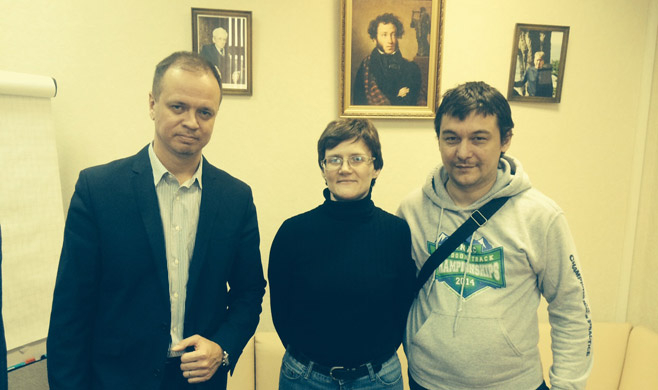
Pavlov got the treason case against Svetlana Davydova, center, dropped.
Shaming the Courts
Pavlov believes the job of the lawyer in politically motivated cases is to present undeniable evidence of the person's innocence to make the court "feel ashamed," because the declared presumption of innocence is ignored when courts are fully dependent on the authorities.
"In such cases, unfortunately, our court does not retain its independence; it's simply not possible to do so in the current circumstances," he said.
"I recently met with Ukrainian colleagues who said something interesting that made me dwell on it. Eventually, I came to the conclusion that the longer one person stays in power, the less independence the court has. The more often the authorities change, the more independent the court feels, the more it orientates itself not to the opinion of an unchanging official, but to the opinion of the law. It realizes that if an official is not permanent, it is better to be guided by the law, to make decisions in accordance with the law.
"And when the official is one and the same person, the court — which unfortunately has not become an authority [in Russia], but remains a 'court system' — orientates on something stable. And there is only one thing that is stable: 'Our Everything' [President Putin]."
Tightening the Noose
Apart from the "foreign agents" legislation, a number of laws restricting freedom of assembly and freedom of information have been passed in Russia in the past few years.
"The noose around the rights and freedoms of citizens is being tightened; the laws that have recently been adopted are of a fairly repressive character, restrictive in terms of human rights and freedoms. This also applies to the Internet, where access is being restricted and sites are being blocked.
"First, they moved to protect children from harmful content, and I immediately said: 'This is not about children, this is about adults." Then they admitted it: 'Yes, and adults, too. We will be deleting extremist information as well, and blocking sites.' And now we see that the desire of [Russian media watchdog] Roskomnadzor is sufficient to block a site; no courts are needed anymore.
"Of course, all these constraints are not for those who already have their own point of view, they are for those who don't have it. Because you and I will find a way to get around the blocks, but most people will not, they will simply think: 'Well, we couldn't find it, so we'll look somewhere else.' And then it's all around them: propaganda everywhere and Kremlin bots."
Pavlov is not giving up, however, and believes that the situation is not irreversible.
"I hope it's not for long," he said.
"In general, all these restrictions have terrible costs — economic, first and foremost. Economic and political. I just want to believe that at some point the powers that be will begin to understand that the costs are too high. And it all depends on how long those people are willing to continue such a policy when the economy is in trouble, and business is in isolation.
"This in turn depends on how long people are willing to endure it all. It all depends on how many resources and how many lives the authorities are ready to throw into the furnace. Because it's all the same; progress is inevitable. You can hold up the regime for a while, but not forever."
Contact the author at [email protected]
A Message from The Moscow Times:
Dear readers,
We are facing unprecedented challenges. Russia's Prosecutor General's Office has designated The Moscow Times as an "undesirable" organization, criminalizing our work and putting our staff at risk of prosecution. This follows our earlier unjust labeling as a "foreign agent."
These actions are direct attempts to silence independent journalism in Russia. The authorities claim our work "discredits the decisions of the Russian leadership." We see things differently: we strive to provide accurate, unbiased reporting on Russia.
We, the journalists of The Moscow Times, refuse to be silenced. But to continue our work, we need your help.
Your support, no matter how small, makes a world of difference. If you can, please support us monthly starting from just $2. It's quick to set up, and every contribution makes a significant impact.
By supporting The Moscow Times, you're defending open, independent journalism in the face of repression. Thank you for standing with us.
Remind me later.


